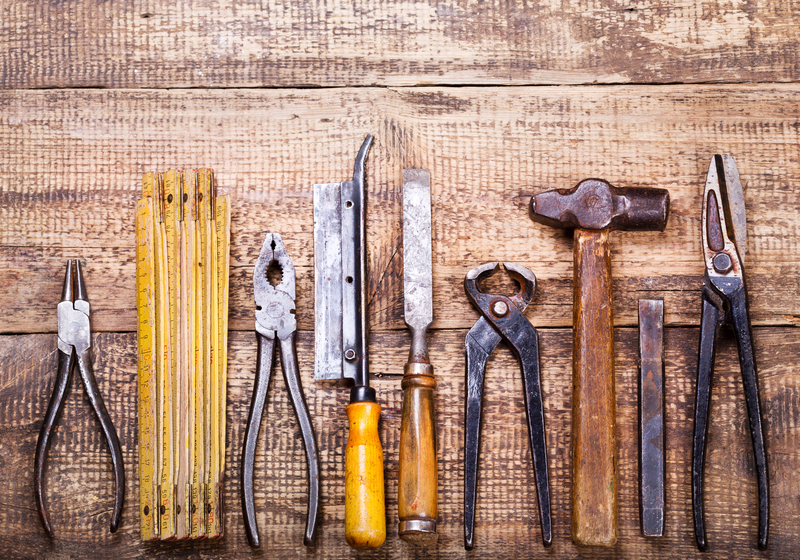Practical Ways to Save Money When Handling Bulky Waste
Managing bulky waste such as old furniture, worn-out appliances, mattresses, or renovation debris can be challenging for households and businesses alike. Besides being an inconvenience, dealing with oversized rubbish can also create unexpected expenses. Fortunately, with a few strategic approaches, you can minimize costs and even turn your trash into treasure. This comprehensive guide outlines practical ways to save money when handling bulky waste, sharing proven strategies, tips, and eco-friendly solutions to help you dispose of large items efficiently and affordably.
Understanding Bulky Waste and Its Challenges
Before diving into cost-saving strategies for bulky waste disposal, it's important to understand what qualifies as bulky waste and why its disposal can be expensive.
- What Is Bulky Waste?
- Old furniture such as sofas, beds, tables, and wardrobes
- Household appliances like refrigerators, washing machines, and ovens
- Mattresses, carpets, and rugs
- Garden waste, branches, and large yard items
- Renovation debris or construction materials
Bulky waste items are typically too large or heavy for standard waste collection services. Their disposal usually requires special collection services, which may incur additional costs. Plus, some items pose environmental and legal disposal implications if not handled properly.

1. Assess Items for Reuse, Donation, or Sale
The first and most eco-friendly way to save money when removing bulky items is by assessing whether those items truly need to be discarded. Many bulky goods still have value or use left in them. Here's how you can capitalize on their potential:
Sell Usable Items
- List unwanted but functional furniture, appliances, or tools on online marketplaces such as eBay, Facebook Marketplace, Craigslist, or local classified ads. This can help you recover some cost, or even make a profit while reducing landfill waste.
- Use local apps or community swap groups to advertise your items for sale or swap.
Donate Bulky Items
- Charities, non-profits, shelters, or furniture banks often take donations of usable large items and sometimes offer free bulky waste collection as part of their service.
- Check with local schools, churches, or community centers as they may need furniture, desks, or appliances.
Upcycle and Repurpose
- Creative repurposing is not just environmentally friendly but can save or even make you money.
- Turn old pallets into garden planters, use reclaimed wood for DIY projects, or repurpose a table into a unique home fixture.
By finding new homes or purposes for your bulky waste, you significantly cut down on disposal costs and contribute positively to your community and the environment.
2. Take Advantage of Municipal Bulky Waste Collection Services
Most cities and towns provide municipal bulky waste removal either as a regularly scheduled or upon-request service. These programs are often the cheapest or entirely free bulky item disposal options, especially for residential customers.
- Check your local council's website for collection schedules, limits, and any requirements for booking collections. Some locations provide free pickups once or twice a year, while others offer low-cost special collections.
- Plan your clean-out in advance to coincide with your area's scheduled collection to avoid paying for private haulers.
Pro Tip: Group your waste with neighbors or friends. Municipalities often charge per pick-up or quantity, so sharing a collection slot can further reduce the cost for everyone involved.
3. Use Licensed Private Waste Removal Services Wisely
If municipal services aren't available, or your needs exceed what's offered, private companies can help. However, employing private waste removal companies can be costly if not approached wisely. Here's how to reduce bulky waste removal costs with private services:
- Compare Multiple Quotes: Always get several quotes before booking a service. Prices can vary significantly based on volume, location, and company.
- Consolidate Items: Rather than paying for several pick-ups, gather all your bulky items at once to save on haulage fees.
- Be Present and Specific: Be clear about what needs collecting, and be present if possible. This ensures you only pay for what's taken and avoid misunderstandings or extra fees.
- Choose Reputable, Licensed Haulers: Avoid illegal dumping and potential fines by choosing companies that are licensed, insured, and environmentally responsible.
Tip: Look for services that charge by the volume of waste collected rather than a flat rate -- this can be cost-effective if you have a small load.
4. DIY Disposal: Save Money by Hauling It Yourself
Self-hauling is one of the most affordable ways to handle bulky garbage or junk, if you have access to a suitable vehicle such as a van or pickup truck.
- Locate Your Nearest Dump or Transfer Station: Some local authorities allow residents a certain number of free disposals per year, or charge very low fees, especially for sorted recyclables.
- Prepare and Pack Efficiently: Disassemble furniture and break down items to save space and potentially reduce the number of trips.
- Check for Restrictions: Call ahead to confirm opening hours, acceptable items, and possible fees to avoid wasted trips.
Note: Be sure to follow safe lifting and transportation practices and ask for help with heavy items to prevent personal injury or vehicle damage.
5. Rent a Skip Bin or Dumpster -- But Use It Shrewdly
Renting a skip bin or dumpster can be a cost-effective option, particularly for renovations, large clean-outs, or when producing a significant amount of bulky junk over a short period. Here's how to save money on skip bin rental:
- Book the Right Size: Overestimating leads to paying for unused space; underestimating means extra fees. Ask the rental company for guidance if in doubt.
- Group With Neighbors: Sharing a skip with neighbors, friends, or tenants can divide the cost among several households.
- Don't Mix Waste Types: Many companies charge extra if you combine hazardous, green, or prohibited waste materials.
- Fill Smartly: Break down items and disassemble everything to maximize space and avoid overflow charges.
Some waste management companies offer "wait and load" services, which can be even more economical for quick, one-off clear-outs.
6. Separate Items for Recycling
Sorting your bulky refuse for recycling is not just good for the planet -- it can save you money.
- Identify recyclable materials: Metals, wood, mattresses (springs), electronics, and certain plastics are commonly accepted by recycling centers.
- Deposit at local recycling points: Many materials can be disposed of for free or at significant discount versus landfilling.
- Check with specialty recyclers: Some recyclers or manufacturers accept appliances, electronics, or mattresses for free or low-cost bulky waste recycling.
Some councils, scrap merchants, or eco-businesses even pay for large quantities of metal or specific items (like refrigerators with working compressors).
7. Hire a "Man and Van" or Community Group
For small to medium loads, a "man and van" service can be a budget-friendly bulky waste collection option -- often cheaper than booking a large company.
- Look for recommendations from neighbors, online bulletin boards, or vetted local business directories to avoid rogue traders or fly-tippers.
- Some community groups or start-up eco-businesses may collect usable items for refurbishment or recycling, often for a reduced fee or even for free.
8. Take Advantage of Manufacturer Take-Back and Retailer Schemes
When replacing bulky items such as mattresses, sofas, or appliances, check whether the supplier offers a take-back scheme. Many retailers will remove your old item when delivering the new one, often for a nominal fee or even free bulky waste removal as part of a promotion.
- Large electronics retailers: Frequently collect old TVs or appliances when delivering new products.
- Furniture stores and mattress sellers: May include free removal with purchase -- or offer it at a heavily reduced rate compared to private disposal.
9. Organize a Community or Neighborhood Clean-Up
Bringing neighbors together for a joint bulky waste collection not only increases civic pride but allows you to pool costs and potentially negotiate discounted rates with local haulers or skip companies.
- Contact your local authority -- they may be able to provide free bins, collection services, or special rates for neighborhood clean-ups.
- Coordinate with local non-profits -- some organizations assist with logistics or ensure items are donated and recycled instead of landfilled.
10. Be Proactive: Prevent Future Bulky Waste Pile-Ups
The best way to save money on bulk waste is to avoid generating it wherever possible. Smart buying, conscious disposal, and regular maintenance can all help.
- Buy quality, long-lasting items: Sometimes, investing a bit more up front saves money over time by reducing the frequency of disposal.
- Embrace minimalism: Choose multi-use items and avoid unnecessary purchases.
- Maintain possessions: Proper care, repair, and maintenance can extend the lifespan of appliances and furniture.
- Rent or borrow infrequently used bulky items (like tools, tables, or equipment) rather than buying.

Frequently Asked Questions About Saving Money on Bulky Waste Disposal
How can I avoid hidden fees with private bulky waste collections?
Get a detailed quote in writing before confirming, and clarify what's included (labor, disposal, VAT, etc.). Specify the items and volume as accurately as possible and ask about potential surcharges (e.g., for difficult access, hazardous materials, after-hours collections).
Are charities really interested in old furniture or appliances?
Yes -- if the items are safe, clean, and functional. Many local and national charities operate furniture banks, resell refurbished appliances, or deliver items to homes in need. Donating is a win-win-win for your wallet, the recipient, and the environment.
Is dumping bulky items illegal?
Absolutely. Fly-tipping is illegal, environmentally damaging, and can result in significant fines or criminal convictions. Always use licensed waste carriers or authorized municipal services.
Are there any specific items that are charged extra?
Yes. Items like fridges, freezers, mattresses, tires, and electronics often incur additional fees due to recycling/disposal complexities or environmental regulations. Always ask ahead about surcharges to avoid surprises.
How often can households use free local bulky waste collections?
Policies vary widely. Some councils offer yearly or bi-annual pickups at no extra charge, while others may limit free collections by weight, item count, or frequency. Always check your local authority's guidelines.
Key Takeaways: Helping You Save on Bulky Waste Management
- Reuse, sell, or donate before disposing -- the greenest and often cheapest solution.
- Contact local councils to take advantage of free or subsidized collections.
- Compare private haulers, negotiate, and avoid unnecessary extras to minimize fees.
- DIY self-hauling, recycled separation, and skip bin sharing all offer further savings.
- Plan and prevent: Smart purchasing and maintenance can minimize future costs.
By proactively exploring these practical, cost-effective methods of bulky waste handling, you can not only keep your spaces clutter-free but also protect your wallet and the environment. The next time you're faced with a large disposal project, try these money-saving solutions and see the difference they can make!